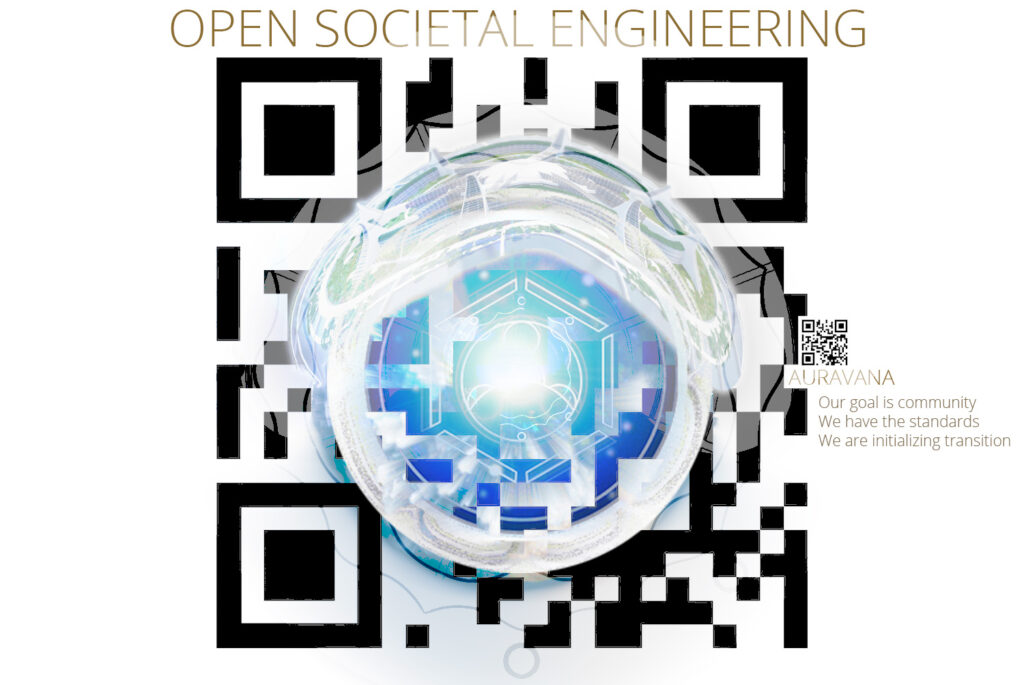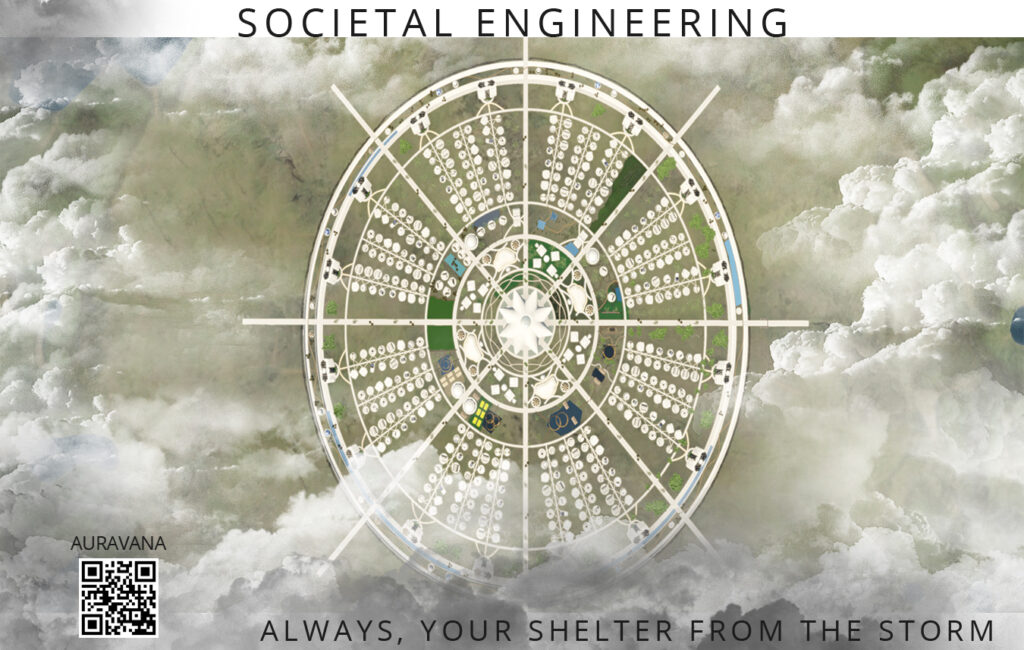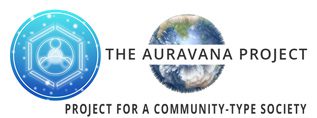What we do
The purpose of Project Auravana is to develop a community configuration of society through a unified set of socio-technical standards that realize a network of integrated habitat systems that optimize human need fulfillment and ecological regeneration. Project Auravana aims to develop a community-type society, its societal information system (SIS) and a habitat service network (HSN).
Our four project types
Standards
Development of a community-type societal standard that explains, and conveys knowledge and agreement.
We set standards.
Habitats
Development and operations of community-type habitats where human needs are serviced.
We operate habitats.
Education
Education of the population to understand, to adapt to, and to contribute to community.
We provide education.
Transition
Transition of people and resources from the market-State into community.
We facilitate transition.
Standards (create the environment)
The Project is: A standards setting organization is essential, because for all socio-technical societies, standards create the environment). Standards are master information sets, containing mandatory requirements, preferred procedures, or guidelines for users and contributors. Standards projects involve either new standards, revisions to existing standards, or removal of standards. Standards are living, in that they are continuously updated and formally published at some appropriate interval or phase. Working groups develop standards. Working groups are comprised of individual experts, and representatives from entities (such as corporations, government agencies or academic institutions) for transition operations. Standards are our common understanding of community. Standards projects are started when there is a need for an idea or concept to be standardized. There is, and always has been, a need for global human flourishing. Those participating in working groups have strong technical knowledge and expertise in the subject matter of the standard project. Project Auravana is accountable to the public at large to provide community-type societal standards to meet the worldwide needs of humanity. Standards benefit the public, in part, by advancing cooperation and the conception of community.
Habitats (create the conditions)
The Project is: A habitat network, and residency therein, is essential, because for all socio-technical societies, people live in physical habitats where the conditions for flourishing are met (or, go unmet). Habitats are living material service locations, containing physical resources, contribution operations, and users. Habitat projects involve new constructions, maintenance, production and resource re-cycling operations. Habitats are operated to a master plan, and aesthetically re-constructed by means of local master habitat planning. Habitat teams are comprised of individual experts, and representatives from entities (such as corporations, government agencies or academic institutions) for transition operations. Habitats are the material configuration of community. Those participating in habitat teams have strong social and/or technical knowledge and skills in the subject matter of the habitat project. Project Auravana is accountable to the public at large to provide community-type societal services and products to meet the worldwide needs of humanity. Habitats benefit the public, in part, by providing free life, technology, and exploratory support services.
Education (create the people)
The Project is: A university education: The education organization exists to facilitate life-long learning about community through descriptions, explanations (knowledge) and skills acquisition — to understand, to adapt, and to contribute to community. Education and orientation are significant processes that will occur during the transition phase, and while living and growing an operational community network of habitats. Education brings clarity and ability, and combined with what is known on the planet now, it is possible to conceive of and to operate a society without trade (the market), coercion (the State), and access-class competition (the orientation). Through a real-world education, a real and better vision of what is possible arises, accompanied by understandings, skills, and a feeling of duty to facilitate fulfillment in society. The breakthrough is a set of socio-technical standards developed by working groups and applied by habitat teams, that together operate a global, human fulfillment service system. Every socio-technical society is arranged to some high-degree based on science and technology. The combustible combination of ignorance, poverty, and power-over-others can be transformed through education into an organization based on access to common heritage resources coordinated to optimize global human need fulfillment.
Transition (change the environmental conditions)
The Project is: A transition operation is essential, because the current configuration of society on the planet in the early 21st century is not representative of community [at the societal scale]. In other words, the socio-technical conditions of society present in the early 21st century must be changed to those of community. The transition is to create the environmental conditions for human flourishing by facilitating human need fulfillment and well-being, and by de-coupling the market and the State from humanity. Transition teams work to transition from one configuration of society to another; namely, from the market-State, in which there is a global market (trade) and many localized democractic and dictatorial States (coercion), to one of community. In community, standards inform the operation of habitat services that meet global human need fulfillment requirements without trade or coercion. Transition projects involve the market, the State, and public relation operations. Market-State conditions have been creating systemically harmful goals for centuries. A transition to community [at the societal scale] requires the creation of information standards and physical habitats that generate systemically beneficial conditions for human flourishing. Transition operations benefit the public, in part, by moving people and resources into a community configuration of society.
The environment creates goals, and
the goals create the environmental conditions,
after being educated and acting on the goals.
It is possible to transition to better societal goals.
Our main projects
We are the community standards setting organization.We are the habitat presidency program.
We are the operators of habitats.
We are the educators (and learners) about community.
We facilitate the transition of the market to community
We facilitate the transition of the State to community.
Who are we
We are a worldwide professional socio-technical standards setting and habitat operating organization.
We do the work of societal-level community standardization and residency service habitation. We facilitate education and the transition to community.
WE ARE SOCIETAL-SYSTEMS DEVELOPERS;
WE DO THE WORK OF SOCIETAL ENGINEERING
we are societal engineers
The Future is Community
Together, we maintain the world’s most open and advanced standard for community at the societal scale. Through contribution, we facilitate global human need fulfillment within a network of habitat (city) operations. If you are not content with the world the way it is, we have already envisioned and standardized a better future. We have a sufficient and living information system to bring community into our lives at the societal level.
If you want to survive and thrive together, join us.

Promoting global cooperation and innovation
Effective human need fulfillment requires cooperation. Standards are the information-base of cooperation. Habitats are the material base of human need fulfillment. Standards development serves to advance global prosperity, but it can only do so if the standards development is conducted consistent with the community values of openness, transparency, and cooperation.
In the early 21st century, competition laws through the world rest on the premise that competition in the production of products and services is the best way and only way forward. It is now possible to see how there is an alternative that has always been there, but yet to be standardized. We have achieved a unified model for cooperative production, and are working on a transition thereto.

The contribution service team is the organization coordinates the enrolement of personnel working on societal standards, habitat operations, and transition operations. The societal standards setting sub-contribution team develops standards. The habitat service network team uses (operationalizes) standards to meet material human need fulfillment requirements. The transition team develops positive working relationships with market, State, and public entities, that slowly move resources and people into a community configuration of society.
